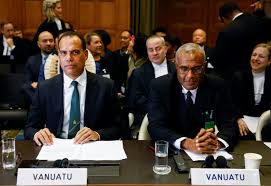In a major moment for global climate justice, the International Court of Justice (ICJ) will soon release its first-ever legal opinion on climate change. This decision could shape how countries are held responsible under international law for causing environmental harm.
The case was brought forward by the small island nation of Vanuatu, along with several other countries that are especially vulnerable to the effects of climate change, such as rising sea levels, flooding, and extreme weather.
Why This Ruling Matters
The ICJ is the top legal body of the United Nations and is based in The Hague, Netherlands. In this case, the court’s 15 judges studied over 10,000 pages of legal documents and listened to two weeks of oral arguments, making it one of the biggest cases in the court’s history.
Vanuatu and its supporters asked the court to answer two key questions:
What legal responsibilities do countries have to fight climate change?
What legal consequences should there be for countries that cause environmental harm but fail to act?
The court’s opinion, expected to be hundreds of pages long, will not be legally binding, but it will be highly influential. Governments and organizations around the world may use it to shape future climate laws, treaties, and negotiations.
Vanuatu’s representatives argued that current international agreements like the Paris Agreement are not strong enough and that countries need to be held accountable under broader international law—including human rights law and the law of the sea.
“The ICJ is the only court that can look at all areas of international law together. It must give a clear answer,” said Vanuatu’s legal team.
Vanuatu’s Climate Minister Ralph Regenvanu added,
“It’s not just about science. It’s about fairness. Rich countries caused the damage, but small islands like ours suffer the most. This is like a new form of colonialism.”
He emphasized that polluting countries should not only stop harming others but should also pay reparations for past damage caused by emissions.
What Polluting Nations Say
Countries like the United States, the world’s biggest historical emitter of greenhouse gases, argue that existing climate agreements are enough. The U.S. and some other major emitters are cautious about the idea of legal penalties or reparations, especially when it comes to actions taken in the past.
In 2022, wealthy nations did agree to create a loss and damage fund to help poorer countries deal with current effects of climate change. But this fund is limited, and it doesn’t yet address legal accountability for past pollution.
Voices from the Pacific
Vishal Prasad, a young climate activist from Fiji, was one of 27 university students who helped launch this case back in 2019. Now, he leads the Pacific Island Students Fighting Climate Change group.
“I’m nervous and emotional,” Prasad said. “For us in countries like Kiribati, Tuvalu, and the Marshall Islands, this isn’t just a legal issue—it’s about survival.”
He added that in Pacific culture, people believe in wayfinding—navigating by the stars and correcting your course when you’re going the wrong way. “The world must do the same with climate change,” he said.
What Comes Next
The ICJ will deliver its opinion on Wednesday at 3 PM (local time in The Hague). If the court supports Vanuatu’s arguments, it could:
Set stronger legal expectations for countries to cut emissions,
Push for climate justice for nations already suffering,
Open the door to reparations for past environmental harm.
While the opinion won’t directly punish any countries, it may become a powerful tool in future climate negotiations and legal action.
Conclusion
This case marks a turning point in the global conversation about climate change. It’s not just about science or politics anymore—it’s about rights, justice, and accountability.
As the world waits for the ICJ’s decision, one thing is clear: the voices of the most affected are being heard loud and clear in the world’s highest court.



